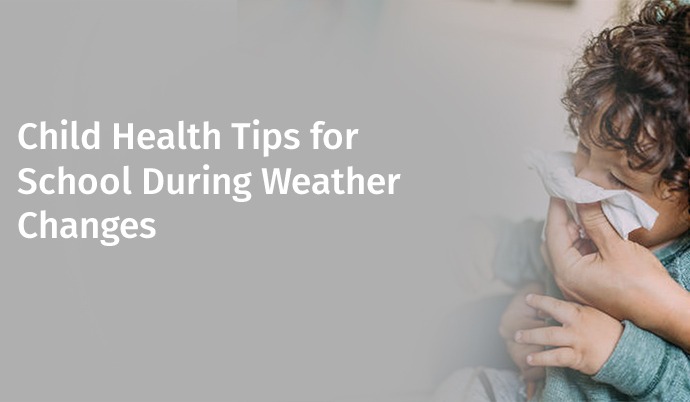
Key Takeaways: Your Child's Weather-Change Wellness Plan
Why Weather Changes Affect Children's Health
A child's body is still developing and learning to adapt, making them more prone to deal with the stressors that changes in weather create.
Essential Child Health Tips for a Resilient Immune System
Building strong kids' immune health is a daily effort, but it becomes even more important during these transitional months.
1. The Golden Rule of Dressing
Rather than a big heavy coat, dress your child in layers, maybe a t-shirt, long-sleeve shirt, and lightweight jacket. This will allow your child to add or remove clothing as necessary as the temperature fluctuates throughout your cycle of school day, keeping them comfortable and preventing chills.
2. Nutrition: Fueling Their Immune Fighters
A balanced diet is the foundation of good health.
3. Hydration: The Unsung Hero
Make it a priority for your child to drink lots of water during the day — on average, kids need half their body weight in ounces of water! Staying hydrated is vital to every function in the body, including the immune response. While we know plain water is good, warm fluids such as soup or herbal tea can also be cozy and helpful on chilly days.
4. Sleep: The Body's Repair Shop
Most school-aged children need the sleep equivalent of 9-12 hours per night uninterrupted. Sleep is when the body rests and repairs, and produces cytokines, proteins that are important in fighting infection and inflammation. Having a good sleep routine, or schedule, helps that natural defense.
Hygiene and Proactive Protection
These simple habits are fundamental to good pediatric health care and are highly effective in a school environment.
When to Seek Expert Advice
Although children can fall ill regardless of how well they are cared for, knowing when to take your child to a pediatrician is important.
Expert Pediatric Health Care
Monitoring your child's health throughout different seasons takes attention to detail and sometimes, the help of an expert. The Pediatric department in SGRH can provide everything from routine check-ups and vaccinations to expert diagnosis and care for seasonal diseases. Consulting with a specialist helps ensure that your child maintains optimal immune health.
For expert advice on your child’s health and wellness, book an appointment with the Pediatric specialists at Sir Ganga Ram Hospital today.
Frequently Asked Questions (FAQs)
Q1: How can I help my child avoid seasonal allergies at school?
To reduce exposure, consult your local pollen counts, keep windows shut when pollen counts are high, and remind your children to wash their hands and face after playing outdoors. A pediatrician can also recommend child-safe antihistamines to use if necessary.
Q2: Should my child wear a mask to school during flu season?
Wearing a mask is a great way to add another layer of protection, especially during peak illness seasons or if your child’s immune system is compromised.
Q3: What is the best way to get a picky eater to eat foods that help them fight infections?
Make healthy food fun! For example, you can make "rainbow" plates with different colored foods, let your child participate in simple food preparation, or hide fruits and vegetables, such as spinach, in smoothies.




